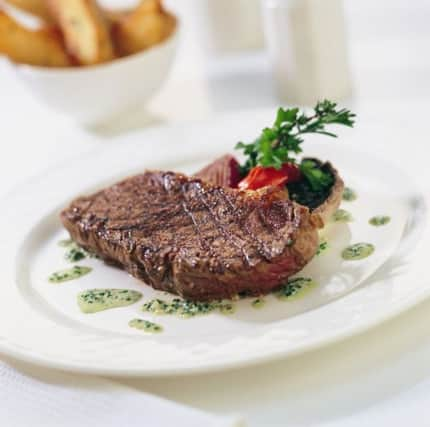Northern Ireland's excellent beef really is produce to be very proud of


In Northern Ireland we produce some of the best beef in the world and we’re internationally respected for it. When I see beef from here name checked on menus across the UK, it makes me feel very proud.
Last year I cooked Peter Hannan’s sugar pit cured beef cheek for a charity dinner in Borough Market in London. I was cooking alongside 10 other well known women chefs from across the UK and they, and the guests, were blown away with the quality of this product.
Advertisement
Hide AdAdvertisement
Hide AdBeef cheeks are one of those cuts that not that long ago would have gone into mince or sausages but are now celebrated as a great cut of meat. I cooked them slowly in red wine, passata with root vegetables until they were fork tender and then topped with crunchy garlic and parsley buttery breadcrumbs. Some of the chefs took leftovers of the beef.
Olia Hercules, a Ukranian born chef and food writer, made hers into a soup with beetroot and London based food writer Rosie Birkett made hers into a hash with a fried duck egg on top.
Many butchers in this country, like Peter Hannan, are adding value to already good meat. Jonny Cuddy of Ispini Charcuterie, based in Aughnacloy, won best charcuterie in the UK at the Great Taste Awards for his breasola. This is an air dried salted beef originally from the Lombardy region of Italy. Jonny would give the Italians a real run for their money. With Brexit looming it’s comforting to know that our agri food industry is stronger than ever and something that will set us apart here. Our meat is trusted globally which makes it gold dust in a competitive market.
Good beef is not cheap but it’s better to have a small amount of something great with traceable provenance than a load of imported produce of lesser quality. Buying rare breed beef, like Dexter, Irish Moiled and Shorthorn, makes sense on so many levels. By eating these animals, we’re actually keeping the breed alive. Small wonder that The Rare Breeds Preservation Trust has the motto “eat it to keep it”. They may cost a bit more but the flavour is massive. I had roast beef at a dinner last month and to be honest if I’d blind tasted it, it might as well have been cardboard. I would have preferred to have the vegetarian option.
Advertisement
Hide AdAdvertisement
Hide AdHopefully the weather is on the turn for the better and it’s time to dust off the barbecue. Expensive cuts like fillet and sirloin are perfect for cooking over flames but hanger and flat iron have all the taste too, at half the price. When you cook an excellent steak, you don’t need to gild the lily – a dollop of flavoured butter is all you need. Cook chopped shallot in red or white wine until the liquid has evaporated and whizz with butter, herbs, garlic – let your imagination run riot.
One of the first things I cooked in college in Belfast, back in the eighties, was the classic beef dish carbonnade. We cooked frying steak in a sauce of Harp lager – there were no micro breweries back then.
Despite the ingredients I thought this dish was the height of sophistication and completely delicious . Nowadays I do a souped up version. Get your butcher to bone, roll and tie neat pieces of shin and slowly cook them in a local IPA and dry cured bacon. Serve with mashed potatoes for a true taste of Northern Ireland. For the recipe this week use a local IPA. There are too many to mention but, like our beef, they’re all pretty special.
We’ve come a long way on our food journey here. Sourcing beef from a butcher makes sense both economically and from a flavour point. Buying rare breed beef makes even more sense. Castlescreen Dexter make a vegetable roll from their cows. It’s something I crave on a regular basis – fried in a pan and served with turnips cooked in Abernethy smoked butter and boiled spuds - the perfect meal at a budget price.